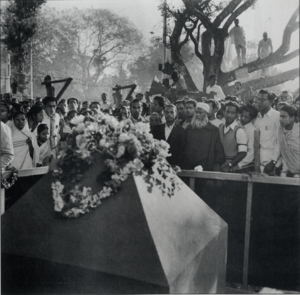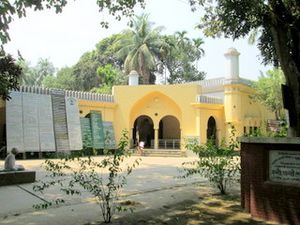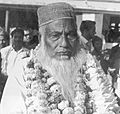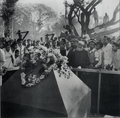Abdul Hamid Khan Bhashani facts for kids
Quick facts for kids
Mazlum Jananeta
Abdul Hamid Khan Bhashani
|
|
|---|---|
|
আব্দুল হামিদ খান ভাসানী
|
|
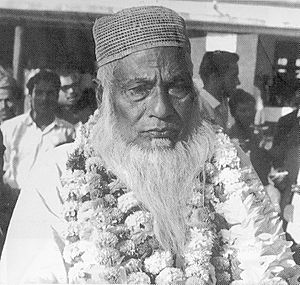
Abdul Hamid Khan Bhashani
|
|
| Member of Assam Legislative Assembly | |
| In office 1936–1946 |
|
| Prime Minister | Muhammed Saadulah |
| Succeeded by | M. M. Abul Kasem |
| Constituency | Dhubri (South) |
| Member of Parliament of Pakistan | |
| In office 1954–1955 |
|
| Governor | Iskander Mirza |
| Member of Parliament of Bangladesh | |
| In office 10 January 1973 – 15 August 1975 |
|
| President | Sheikh Mujibur Rahman |
| Personal details | |
| Born | 12 December 1880 Dhangara, Sirajganj District, Bengal Presidency |
| Died | 17 November 1976 (aged 95) Dhaka, Bangladesh |
| Resting place | Santosh, Tangail, Bangladesh |
| Nationality | British Indian (1880–1947) Pakistani (1947–1971) Bangladeshi (1971–1976) |
| Political party | National Awami Party (since 1957) Awami Muslim League (1949–1957) |
| Religion | Islam |
| Denomination | Sunni |
| Education | Darul Uloom Deoband |
| Arabic name | |
| Personal (Ism) | ʿAbd al-Ḥamīd عبد الحميد |
| Patronymic (Nasab) | ibn Sharāfat ʿAlī إبن شرافة علي |
| Epithet (Laqab) | Maẓlūm Jananeta مظلوم جننيتا |
| Toponymic (Nisba) | Khān خان al-Bahāshānī البهاشاني |
Abdul Hamid Khan Bhashani (born December 12, 1880 – died November 17, 1976) was a very important Bengali politician. People often called him Maulana Bhashani. He was active in politics during three big periods: when India was ruled by the British, when Pakistan was formed, and after Bangladesh became independent.
Maulana Bhashani was known as Mozlum Jananeta, which means 'Leader of the Oppressed'. He earned this name because he always stood up for poor people. He became very popular among farmers and helped create the East Pakistan Peasant Association. Because he believed in ideas similar to Islamic Socialism, some people also called him 'The Red Maulana'.
He studied at Darul Uloom Deoband, a famous Islamic school. He also took part in the Khilafat Movement, which protested against the end of the Ottoman Empire. He led Muslims in Assam to vote for Sylhet to join Pakistan in 1947. He started the Pakistan Awami Muslim League (AML), which later became the Awami League. But he later disagreed with some leaders in the AML, like Huseyn Shaheed Suhrawardy, about East Pakistan's independence. So, he started a new party called the National Awami Party (NAP). Bhashani also didn't like it when Pakistan joined defense groups with the US.
Contents
Early Life and Education
Abdul Hamid Khan Bhashani was born in 1880 in Dhangara village, Sirajganj District, which was then part of the Bengal Presidency. His father was Sharafat Ali Khan. From 1907 to 1909, he studied religion at Darul Uloom Deoband. His teachers and other thinkers there inspired him to oppose British rule. In 1909, he started teaching at a primary school in Kagmaree, Tangail.
A Life in Politics
Fighting for Change in British India
Bhashani became active in politics in 1917. He joined the Nationalist party and later the Indian National Congress in 1919. He was arrested and put in jail in 1920. After being released, he joined the Khilafat movement. In 1921, he took part in the Non-cooperation movement against British rule. He was jailed again with many of his supporters.
In 1930, he joined the All-India Muslim League. He was elected as a Member of the Legislative Assembly (MLA) in Assam Province in 1937. He served until 1946. In 1944, he became president of the Muslim League at its Barpeta meeting. He then worked hard for the Pakistan Movement, which aimed to create a separate country for Muslims.
Leading the Way in Early Pakistan
After India and Pakistan became independent in 1947, Bhashani started working against the new government. On June 23, 1949, he founded the East Pakistan Awami Muslim League. He became its president. He organized the first meeting of the All Pakistan Awami Muslim League in Dhaka on July 24, 1949.
On January 31, 1952, he formed the "All Party Language Movement Committee." He strongly supported making Bangla a national language in Pakistan. He also removed "Muslim" from the Awami Muslim League's name in 1953, making it the Awami League.
The Muslim League government lost popularity after the Bengali language movement in 1952. People felt it wasn't protecting the interests of East Pakistan. In 1954, Bhashani's party joined with others to form the United Front (East Pakistan). This group won the provincial election in East Pakistan, defeating the Muslim League.
In May 1954, Bhashani went to Stockholm. The government of Iskander Mirza stopped him from returning to East Pakistan. They even called him a communist. From May 7 to 23, 1956, Bhashani went on a hunger strike. He demanded food for people affected by famine.
At the Kagmaree Conference in February 1957, Bhashani decided to separate from the West Pakistani authority. He felt they were acting against East Pakistan. On July 25, 1957, he formed the East Pakistan National Awami Party (NAP).
Later Political Actions
Bhashani played a key role in choosing Fatima Jinnah as a candidate for the 1965 Pakistani presidential election. He convinced her to run against Ayub Khan.
In 1969, Bhashani started a movement to free Sheikh Mujibur Rahman. An American journalist, Dan Coggin, said Bhashani was a major reason for the 1969 Mass uprising in East Pakistan. This uprising led to the fall of the Ayub Khan government. In 1970, Bhashani called for East Pakistan to become independent.
He also organized a big farmers' conference in March 1970. There, he asked the government to hold a vote on whether people wanted Islamic Socialism. He warned of fighting if the military government didn't listen.
Role in the War of Independence 1971
Moulana Abdul Hamid Khan Bhashani was the Chairman of the Sorbodoliyo Songram Parisad in 1971. He asked China to help Bangladesh in its fight for freedom. However, China did not respond to his request.
After Bangladesh Became Independent
After Bangladesh became independent, Bhashani wanted to be a responsible opposition leader. Many progressive groups joined his NAP party. But soon, disagreements within these groups weakened his position.
Bhashani strongly criticized the government led by the Awami League and BAKSAL. He warned Sheikh Mujibur Rahman against making Bangladesh a one-party state. Bhashani was very sad when Mujib and his family were killed. He cried and prayed when he heard the news.
In May 1976, he led a huge march called the Farakka Long March. This march demanded the removal of the Farakka Barrage. India built this barrage to change the flow of the Ganges River. This caused the Padma River in Bangladesh to dry up, leading to desertification.
The government of Bangladesh supported Bhashani's Farakka Long March. Hundreds of thousands of people gathered in Rajshahi to join the march. On March 16, 1976, Bhashani spoke to the crowd in Rajshahi. People walked over 100 kilometers for days, reaching Kansat, near the India-Bangladesh border.
Bhashani's Farakka Long March was the first big movement by Bangladeshis against India. They demanded a fair share of the Ganges' water. Since then, March 16 is observed as Farakka Long March Day in Bangladesh.
His Ideas and Beliefs
In the early 1950s, Bhashani felt that Pakistan could not stay united. He believed this because West Pakistan had too much control. At the Kagmari Conference, he famously said Assalamu Alaikum to West Pakistan, meaning goodbye. He refused to take part in the 1970 national election. He said it would only help West Pakistan keep ruling.
From 1969, his favorite slogans were Swadhin Bangla Zindabad (Long Live Independent Bengal) and Azad Bangla Zindabad (Long Live Free Bengal). His dream of an independent Purba Bangla (East Bengal) came true when Bangladesh became a country in 1971. He believed that religion and state should be separate. He was a devout Muslim who also supported socialism. He spoke out against the Bangladesh Jamaat-e-Islami party.
Journalism and Publications
The Daily Ittefaq has been a very popular Bengali newspaper in Bangladesh since the 1970s. Before that, it was a weekly paper called Weekly Ittefaq. After the British left in 1947, the Muslim League became the ruling party. Soon, opposition groups started, and the Awami Muslim League was founded. Bhashani was one of its main leaders.
Bhashani and Yar Mohammad Khan started publishing the Weekly Ittefaq in 1949. This popular weekly newspaper criticized the Muslim League government. The journalist Tofazzal Hossain Manik Miah was its editor.
On February 25, 1972, Bhashani started publishing a weekly paper called Haq Katha. It quickly became very popular. It openly talked about the problems and bad rule of the Awami League government after Bangladesh became independent. It was a pro-Chinese and socialist weekly. Later, Sheikh Mujib banned this weekly paper.
Death and Lasting Impact
Bhashani passed away on November 17, 1976, in Dhaka, Bangladesh. He was 96 years old. He was buried in Santosh, Tangail.
Bhashani is remembered as a leader who fought against powerful empires and for the rights of common people. He believed in a fair society and left-leaning politics. In 2004, a BBC poll ranked Bhashani as number 8 among the Greatest Bengali of all time.
Images for kids
 | James Van Der Zee |
 | Alma Thomas |
 | Ellis Wilson |
 | Margaret Taylor-Burroughs |


